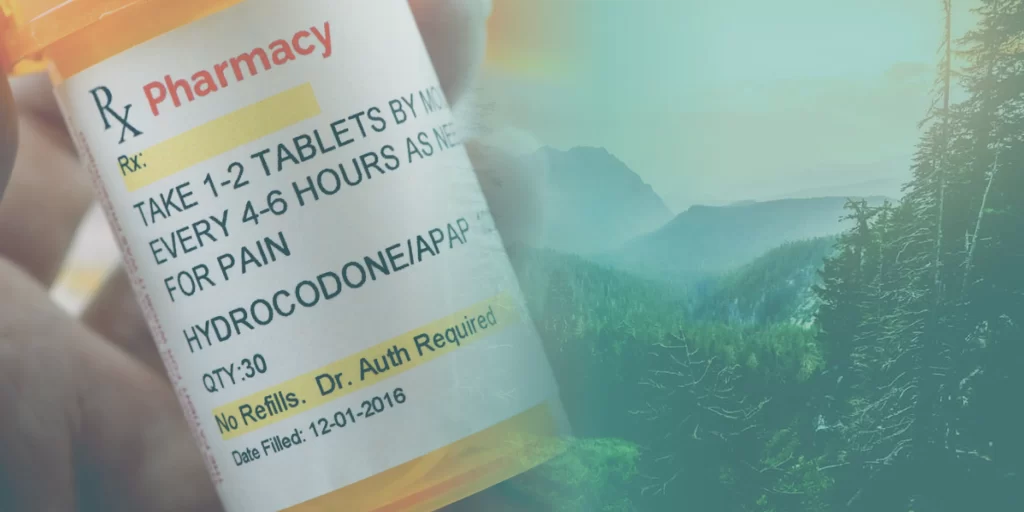Hydrocodone Withdrawal & Detox Treatment
Written by Thomas Christiansen
& Medically Reviewed by Bryan Mayfield
Medically Reviewed
Up to Date
Last Updated - 6/17/2022
View our editorial policy
Hydrocodone is the generic name of a prescription pain medication that belongs to a class of drugs called opioids. Hydrocodone is not commercially available by itself. It is combined with other, non-opioid, medications in tablet or liquid form. One such combination is hydrocodone and acetaminophen (Tylenol). There are multiple brand names for this combination including Lortab, Norco and Vicodin. Another combination drug is the brand-name drug Vicoprofen, which contains hydrocodone and ibuprofen (Motrin, Advil). The amounts of hydrocodone in each combination varies.
In recent years, there has been increased attention on the impact of prescription opioids in the United States. The Centers for Disease Control and Prevention (CDC) conducted research which revealed that hydrocodone-containing medications are among the three most common drugs involved in opioid overdose deaths in the United States. Methadone and oxycodone were the other two drugs identified by the CDC.
The Recovery Village Ridgefield provides a safe atmosphere with trained staff for those looking for help with hydrocodone detox and treatment for hydrocodone addiction.
Hydrocodone Withdrawal
Withdrawal is the process the body goes through when someone who has been regularly taking a drug, like hydrocodone, takes less of it or stops taking it completely. Withdrawal is uncomfortable, but it is the first step of recovery.
Physical dependence is generally a prerequisite for hydrocodone withdrawal. A dependence on hydrocodone is not the same as hydrocodone addiction. Dependence occurs when a person’s body needs hydrocodone to function normally.
In contrast, drug addiction is defined by the National Institute on Drug Abuse as, “A chronic, relapsing disorder characterized by compulsive drug seeking, continued use despite harmful consequences, and long-lasting changes in the brain.”
Hydrocodone dependence can lead to addiction. Physical dependence can develop within days of beginning to take drugs containing hydrocodone. It is this physical dependence that sets the stage for the symptoms someone may experience during the withdrawal period.
Hydrocodone Withdrawal Symptoms
Hydrocodone is a short-acting opioid. Other short-acting opioids include heroin and immediate-release forms of oxycodone. The symptoms experienced during hydrocodone withdrawal are similar to those of all short-acting opioids.
Common hydrocodone withdrawal symptoms may include:
- Aches
- Abdominal cramps
- Anxiety
- Chills
- Hot flashes
- Heart pounding
- Insomnia
- Irritability
- Lacrimation (tear production)
- Muscle spasms
- Muscle tension
- Muscle twitching
- Pupillary dilation
- Sweating
- Tremors
- Yawning
Depending on a person’s unique situation and body chemistry, they may not have all of these symptoms, and symptoms may occur for days or weeks. Additionally, the symptoms may occur as a cluster or they may be experienced separately. Experiencing withdrawal is a difficult and critical time for anyone who wants to overcome hydrocodone abuse. The Recovery Village Ridgefield has a variety of resources to help people navigate this process.
Hydrocodone Detox Timeline
The body’s response to the removal of hydrocodone from its system happens over a period that is different for each person. People can estimate how long certain aspects of the detox process will take, but it is important to realize that these are only estimates. Everyone’s detox experience is different.
An important factor that can alter a person’s detox timeline is the method a person has been using to consume hydrocodone. Crushing and snorting hydrocodone generally causes it to enter the bloodstream quickly and therefore take effect faster than if the tablet was swallowed. Smoking or injecting hydrocodone also alter the speed with which it takes effect, as well as the intensity and length of withdrawal. Unapproved methods of use can make the withdrawal process more difficult.
Similar to other short-acting opioids, the hydrocodone withdrawal process happens in two phases: early and late. The early phase refers to the first 72 hours after someone stops taking hydrocodone. Many people have described the period between 36 and 72 hours as especially difficult as this time is when the symptoms can be the strongest. After 72 hours, the late phase of withdrawal begins and then continues until the person no longer experiences symptoms of withdrawal. This process can take anywhere from five to 14 days.
A noticeable improvement in symptoms has been reported to occur around days four through seven, especially when people are recovering under the care of qualified health care professionals at an accredited rehab facility.
Finding a Hydrocodone Detox Center in Washington & Oregon
There are many negative aspects associated with detox and withdrawal. However, detox is a necessary step on the path to recovery. Medically assisted detox can be a great first step for people who want to overcome hydrocodone abuse or addiction.
The Recovery Village Ridgefield is located close to both Vancouver, Washington, and Portland, Oregon. There are options available for both inpatient and outpatient treatment. To find a hydrocodone detox center in your area, you can call The Recovery Village Ridgefield to speak with a representative.
Sources
Kosten TR, Baxter BE. “Effective Management of Opioid Withdrawal Symptoms: A Gateway to Opioid Dependence Treatment.” American Journal on Addictions, January 31, 2019. Accessed on February 21, 2019.
The Centers for Disease Control and Prevention. “Prescription Opioids.” Last updated on August 29, 2017. Accessed on February 21, 2019.
National Institute on Drug Abuse (NIDA). “The Science of Drug Use and Addiction: The Basics” Last updated in 2018. Accessed February 27, 2019.
View Sources
Kosten TR, Baxter BE. “Effective Management of Opioid Withdrawal Symptoms: A Gateway to Opioid Dependence Treatment.” American Journal on Addictions, January 31, 2019. Accessed on February 21, 2019.
The Centers for Disease Control and Prevention. “Prescription Opioids.” Last updated on August 29, 2017. Accessed on February 21, 2019.
National Institute on Drug Abuse (NIDA). “The Science of Drug Use and Addiction: The Basics” Last updated in 2018. Accessed February 27, 2019.
Authorship







